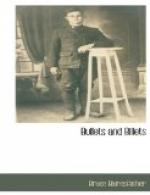But, however that may be, we were now booked for Wulverghem, or rather the trenches which lie along the base of the Messines ridge, about a mile in front of that shattered hamlet. Two days after our tour of inspection we started off to take over. The nuisance about these trenches was that the point where one had to unload and proceed across country, man-handling everything, was abnormally far away from the firing line. We had about a mile and a half to do after we had marched collectively as a battalion, so that my machine-gunners were obliged to carry the guns and all the tackle we needed all that distance to their trenches. This, of course, happened every time we “came in.”
The land where these trenches lay was a vast and lugubrious expanse of mud, with here and there a charred and ragged building. On our right lay the River Douve, and, on our left, the trenches turned a corner back inwards again. In front lay the long line of the Messines ridge. The Boches had occupied this ridge, and our trenches ran along the valley at its foot. The view which the Boches got by being perched on this hill rendered them exactly what their soul delights in, i.e., “uber alles.” They can see for miles. However, those little disadvantages have not prevented us from efficiently maintaining our trenches at the far end of the plain, in spite of the difficulty of carrying material across this flat expanse.
I forget what night of the week we went in and took over those trenches, but, anyhow, it was a precious long one. I had only seen the place once before, and in the darkness of the night had a long and arduous job finding the way to the various positions allotted for my guns, burdened as I was with all my sections and impedimenta. I imagine I walked about five or six miles that night. We held a front of about a mile, and, therefore, not only did I have to do the above-mentioned mile and a half, but also two or three miles going from end to end of our line. It was as dark as could be, and the unfamiliar ground seemed to be pitted like a Gruyere cheese with shell holes. Unlimbering back near a farm we sloshed off across the mud flat towards the section of trench which we had been ordered to occupy. I trusted to instinct to strike the right angles for coming out at the trenches which henceforth were to be ours. In those days my machine guns were the old type of Maxim—a very weighty concern. To carry these guns and all the necessary ammunition across this desert was a long and very exhausting process. Occasional bursts of machine-gun fire and spent bullets “zipping” into the mud all around hardly tended to cheer the proceedings. The path along to the right-hand set of trenches, where I knew a couple of guns must go, was lavishly strewn with dead cows and pigs. When we paused for a rest we always seemed to do so alongside some such object, and consequently there was no hesitation in moving on again. None of us had the slightest idea as to the nature of the country on which we were now operating. I myself had only seen it by night, and nobody else had been there at all.




